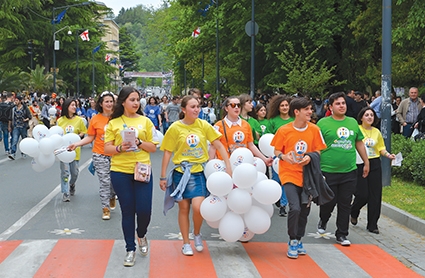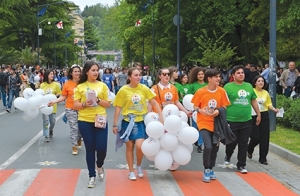World Children’s Day & UNICEF
On June 1 International Children’s Day, GEORGIA TODAY met with Laila Omar Gad, UNICEF Representative to Georgia, to talk about UNICEF programs and initiatives in Georgia.
June 1 was International Children’s Day. How did UNICEF Georgia celebrate the day?
June 1 is celebrated in many countries around the world as the International Day of the Child and UNICEF Georgia took the opportunity to highlight a few of our key messages on the day. Though we consider every day a day for children, on June 1, we met with our key partners to raise awareness about the situation of children in Georgia. We joined the Public Defender’s Office in the presentation of the PDO report on the situation of Georgian children where UNICEF shared its perspective on key priorities. We are also working on further amplifying awareness of the situation of children with disabilities through a number of events related to the See Every Color campaign that aims to, again, raise awareness of stigma and discrimination against people with disabilities, particularly children. If I were to identify three priorities for Georgia in the coming two years, I would say education, education, education! So on June 1, we’re celebrating our partnerships for children’s rights and continue to advocate and bring results for children in Georgia. In celebration of the See Every Color Campaign, Georgian pianist Datuna Aladashvili performed a charity concert at Tbilisi State Conservatoire.
Tell us about the See Every Color Campaign
See Every Color was launched in February and immediately captured the attention of a lot of people—it shows that sometimes people can jump to conclusions about children with disabilities miss how talented or skilled they are. The campaign aims at raising public awareness of stories children with disabilities have; to hear their voices and rise above the misconceptions. The name of the campaign is important as it’s really about seeing every color and recognizing the mosaic that enriches our lives, it’s about recognizing the differences and respecting them. It’s good to know that Georgia is achieving results for persons with disabilities through this campaign.
Which of UNICEF Georgia’s many programs were most successful?
The first one is in relation to childcare reforms. The Government of Georgia held discussions with the Committee of Children’s Rights in January, and the concluding observations highlighted much of the progress that has been achieved in Georgia in childcare reform. Reformed legislation now meets international standards with regards to juvenile justice and we have also seen very concrete results in finding alternative measures for children in contact with the law so that now the majority of children that come into conflict with the law are diverted to alternative measures, not detained. We have also seen progress in the promotion of foster care, alternative care, and, this year, the revision and passing of the Law on Adoption and Foster Care. The Ministry of Health, Labor and Social Affairs of Georgia is working on a number of bylaws to strengthen the quality of services and support that is needed for foster and alternative care for children without parental care. Also, under the umbrella of the childcare reform, we have achieved success in providing quality, integrated services to children with severe and complex disabilities through the promotion of a social model for identification and addressing the developmental needs of children.
The second area of achievement is that of child poverty, where Georgia has achieved tremendous success in child poverty reduction since 2009 through the implementation of social protection measures and reforms that have taken place, particularly in the targeted social assistance scheme.
According to the Welfare Monitoring Study, Child poverty rates are higher in rural areas than in urban areas. Extreme poverty ($1.25 per day, less than 3 GEL) reduced from 3.9 (2013) to 2.1 percent (2015) among the general population, and from 6 to 2.5 percent in children. General poverty indicators ($2.5 per day, around 5 GEL) reduced from 24.6 percent (2013) to 18.4 percent with a reduction in the rate for children from 28.4 to 21.7 percent.
We continue to work toward this goal. The Georgian government is now working on a comprehensive vision for social protection, and UNICEF and other partners are actively involved to make sure that social protection systems and the reforms that are taking place are really working for transformation in Georgia.
Third, is education, which is the foundation for the realization of the rights for children in Georgia. We know that education from pre-school to higher education is really the single, most important factor that lifts people out of poverty and contributes to human capital development, economic growth and prosperity. The tremendous achievement that Georgia has made with the issuing of the early and pre-school education law is a very important step, and we’re working with the coordination council led by the Legal Issues Committee in Parliament to develop a road map, for the short-term, until October 2017, and a long-term road map for four years for the implementation of the law.
What challenges have you faced?
Despite our successes, one in two children between the ages of two and six in rural areas do not get pre-school education and this is unacceptable. We are working with our partners to support reforms in education at all levels. The result of the exams in general education demonstrated that there are big challenges in the quality of education, which is still lagging behind and which is a priority for our collaboration with the Government of Georgia—where we are working with partners to provide the technical assistance in teacher training, curricula development, and in-service and pre-service training for teachers at pre-school and general education level—so that we contribute to establishing an education system that is a fit for Georgia. Children simply can’t be allowed to drop out of school, but it happens due to poor learning outcomes, early marriage for girls and lack of motivation for boys in the secondary level. We’re addressing, with the government, access to education for every child, whether they live in rural areas, or are affected by poverty, and those with different abilities. It’s very important to recognize the role of education in the mother tongue. The Ministry of Education has introduced mother tongue education for students of Armenian and Azeri origin, and we’re also looking at the situation with the children in Abkhazia to improve the learning outcomes of children. We need to strengthen municipal systems and to realize that education methodologies need to reflect a student-centered approach. This is a shift in culture and it is not an easy one, because it’s shifting an approach that has been in place for many years that was largely teacher-centered. We have to make sure that the skills of the 21st century are part of the curriculum for Georgian children, so that they can be a part of a dynamic labor market.
2017 is the Year of Education in Georgia. Education is the pathway to an equitable society, to a competitive economy, and it’s the foundation of human capital development. It also helps Georgia to fulfil and realize its aspirations as part of the SDG’s (Sustainable Development Goals). With good education, you also address other rights, lifting the population out of poverty, closing the gender gap and making sure that all children with all abilities have the same right to fulfil themselves through education. We need to invest in education more, and make sure that parents are aware of the importance of accessible quality education for all; we need to make sure that there are enough resources and that early education is affordable to all.
Nino Gugunishvili












